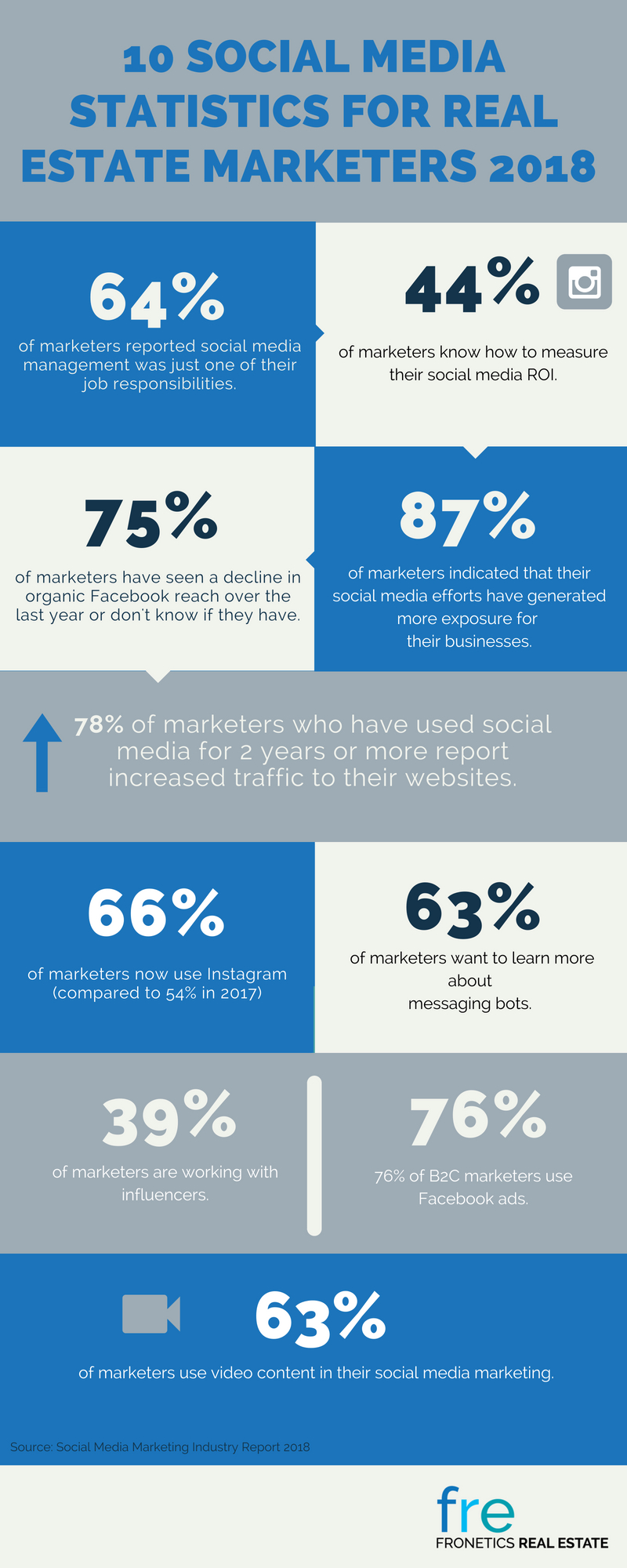Your search results for "Reliable CPC-CDE-RECERT Braindumps Sheet 🍳 Best CPC-CDE-RECERT Practice 🔚 Test CPC-CDE-RECERT Sample Questions 💉 Easily obtain free download of ▶ CPC-CDE-RECERT ◀ by searching on ☀ www.pdfvce.com ️☀️ ✊Exam CPC-CDE-RECERT Study Solutions"

10 Social Media Statistics for Real Estate Marketers 2018
The latest social media statistics show growth of Instagram, social messaging bots, and video content.
We joke around here that one thing that will always stay the same is that social media will always be changing. 2018 has been a remarkable example of that thus far, particularly in regards to platforms like Facebook.
Every so often, we like to take a step back and look at what the data is telling us about where social media is heading and what that might mean for real estate marketers.
Social Media Examiner’s 10th annual study, 2018 Social Media Marketing Industry Report, surveyed more than 5,700 marketers from across the world in a variety of industries — including real estate. It offers a really comprehensive view of what’s going on in social media in our industry and beyond.
I’ve pulled out 10 social media statistics from this report that I want to talk about in more depth. I think they say a lot about where social media is headed and what real estate marketers should be paying attention to.
10 social media statistics for real estate marketers
1) For 64% of marketers, social media management is just one of their job responsibilities.
This one blows me away, knowing how much time and effort it takes to run a company’s social media program. Only about one-third (36%) of marketers manage social media full time. The other two-thirds have to do that on top of their other responsibilities. That’s crazy!
Developers, property managers, and real estate marketers: it’s time to recognize how important social media is for marketing your property and dedicate the appropriate resources to social media management. If you can’t afford to hire someone to do it full time, consider outsourcing this task.
2) Only 44% of marketers agree they can measure their social media ROI.
Only 10% of survey respondents “strongly agree” and 34% “agree” with the statement, “I am able to measure the return on investment (ROI) for my social media activities.”
Again, I’m kind of blown away. As a firm that relies on data and analytics to inform our processes and strategies, including social, it seems irresponsible to not know if your efforts are effective.
Ok, on one hand, it’s actually really difficult to measure social media ROI. That’s in large part because so many of the benefits are intangible. You should really be thinking of social media investment in terms of potential, not dollars.
BUT there are some ways to calculate ROI for all your content marketing and social media efforts. Here are a few resources:
- What Metrics Should You Track in Real Estate Marketing?
- The Metrics You Should Be Measuring in Real Estate Marketing (Hint: Not Vanity Metrics)
- How to Measure Brand Awareness: A Guide for Real Estate Marketers
3) 75% of marketers have seen a decline in organic Facebook reach over the last year or don’t know if they have.
A significant 52% of marketers surveyed said they saw their Facebook reach decline in the last year. Plus, 23% of marketers surveyed were unsure if it had or not — probably not a good sign. Yet 97% of B2C marketers are using Facebook. Something’s not adding up for me here.
As we’ve written about a lot recently, businesses need to be keeping a close eye on Facebook in light of all the recent changes. While we at Fronetics Real Estate are not ready to write off Facebook for business (especially real estate companies) completely yet, it’s time to start doing things a little differently.
Here are a few things you should do immediately to ensure you’re still reaching your target audience:
- Focus on newsworthy content that drives engagement. You need to start thinking of Facebook as a place to post and discuss active news items, hot-button issues, and highly shareable content (content that is educational or entertaining, for example).
- Tell your community to access the See First feature. Users who still want to see posts from certain Pages they follow can choose “See First” in News Feed Preferences. So, quite simply, we suggest asking your followers to choose to see your content.
- Consider your ad budget. Especially for new properties or those who rely heavily on referral traffic, you might want to consider reallocating budget to sponsored ads.
Stay tuned to the Fronetics blog as we continue to gather information and offer suggestions.
4) 87% of marketers rank more exposure for their businesses as the primary benefit of their social media efforts.
Building brand awareness is a key benefit of social media use for real estate. The Social Media Examiner survey respondents said that increased traffic was the second major benefit, with 78% reporting positive results. These top two benefits have remained virtually unchanged for 4 years.
5) 78% of marketers who have used social media for 2 years or more report increased traffic to their websites.
Also to note, 83% of those who have used social media for 5 or more years “strongly agree” or “agree” that traffic has increased to their websites because of social media activity.
I wanted to pull these social media statistics out because they reinforce the time-honored truth that content marketing (including social media management) is a long-term solution — not an overnight fix. The benefits, especially in terms of metrics like traffic, grow exponentially over time.
You have to allow time for prospects to find you and for your audience to grow organically. Use your social media platforms as a means to distribute meaningful information to your target audience and to communicate with prospects and residents, and it will pay off.
6) 66% of marketers are now using Instagram.
In 2016 and 2017, we answered a lot of questions about Snapchat. Founder of the Content Marketing Institute Joe Pulizzi named Snapchat one of the next big trends in content marketing for 2017. Everyone thought this platform was going to be our new social media darling.
Instead, Instagram has surpassed Twitter and LinkedIn to be the second-most-used social media platform. (It was fourth in 2017.) Use is up dramatically from 54% in 2017. Those are numbers worth paying attention to.
Most of our real estate clients use Instagram with great success. If you’re not on this platform, it’s time to join.
7) 63% of marketers use video content in their social media marketing.
One real estate marketing trend everyone got right? The growing prevalence of video.
Not only do nearly two-thirds of marketers use video content in their social media marketing, 23% use live video. What’s more, 77% plan to increase video content and 63% plan to increase live video in the next year.
The real estate industry is embracing the power of video marketing. And the good news is, you don’t need expensive camera, lighting, or a production studio — your smartphone can be just as effective for creating video content for your social media outlets.
8) 70% of marketers want to learn more about messenger bots.
Here’s a big takeaway from the survey: Everyone’s talking about messenger bots/social messenger apps. While adoption is still pretty low (only 15% are using Facebook messenger bots now), 51% of survey respondents plan to include them in future marketing.
It’s time to start reading up on marketing automation tools like chatbots and social messenger apps. We’ve got a lot of information about these things scheduled on our blog in the next few months, so keep coming back for more information on how these tools apply to real estate marketing.
9) 39% of marketers are working with influencers.
Influencer marketing is another trend we’ve been talking about lately. It makes sense: Buyers value the opinions of peers and colleagues. In fact, 82% of Americans seek recommendations when making a purchase of any kind. Such a major purchase like real estate can be greatly influenced by what buyers’ peers think of the neighborhood, community or building, etc.
In real estate, it’s important to consider other people who might influence buyers and renters. Aside from family and friends, financial advisors, brokers, interior designers, and celebrities (be they local professional athletes or social media celebrities) can have an impact on buyers’ opinions of a property.
10) 76% of B2C marketers use Facebook ads.
Interesting that more than three-fourths of B2C brands advertise on Facebook. On one hand, if you’re not doing it, do you lose your seat at the table? But on the other, are there opportunities on other advertising platforms that aren’t so crowded?
The survey also found that 72% of B2C marketers are interested in learning about Instagram ads. This is likely because of the platform’s phenomenal growth and, no doubt, brands’ success with it thus far. It’s something to think about when planning your social advertising.
If you’re interested, I recommend reading the whole 44-page report from Social Media Examiner. There are a ton of really interesting social media statistics that offer great insight into how marketers are using social media and how it’s changing — both over the the last few years and in the short-term.
What social media statistics are most interesting to you?
Related posts:
- A Visual Guide to Social Media Posting Frequency for Real Estate
- How to Use Social Media Hashtags in Real Estate Marketing
- Social Media Can Be a Strategic Weapon in Real Estate Marketing
Your search results for "Reliable CPC-CDE-RECERT Braindumps Sheet 🍳 Best CPC-CDE-RECERT Practice 🔚 Test CPC-CDE-RECERT Sample Questions 💉 Easily obtain free download of ▶ CPC-CDE-RECERT ◀ by searching on ☀ www.pdfvce.com ️☀️ ✊Exam CPC-CDE-RECERT Study Solutions"

Why You Should Benchmark Real Estate Marketing Against Competitive Properties
Taking the time to benchmark real estate marketing gives you context for your performance — and shows you what prospective buyers/tenants see when searching for properties.
When people are searching the internet for apartments or condos, what are they seeing? Part of an effective, data-driven marketing strategy is regularly taking the time to benchmark real estate marketing against competitive properties.
We all know that competition drives results. Take Elaine Thompson and Michael Phelps. In August 2016, Thompson claimed the title of the world’s fastest woman, and Michael Phelps became the most decorated Olympian of all time. They achieved these incredible feats by continuously pushing themselves to do better — and they weren’t just tracking and measuring their personal performance. They were keeping track of the performance of their peers and competitors. The data helped to give them the drive they needed to improve their own performance.
Why benchmark real estate marketing?
The same is true when it comes to measuring real estate marketing performance.
Looking inward, focusing on key performance indicators (KPIs) like website traffic, social media engagement, and lead conversion metrics is important. But these metrics will only get you so far.
You need to be looking at what’s happening outside your business and benchmark real estate marketing performance against competitive developments, properties, and even companies. That way, you’ll get the knowledge and drive you need to improve your performance and chance of success.
In addition, keeping track of what your competitors are doing can help you to identify threats and strategic opportunities for your properties. If you see that everyone is advertising on Trulia, for example, and you’re not, you might want to think about trying it. Or, you might notice that no one in your market is leveraging Facebook Marketplace property listings yet. Is this a place where you could gain strategic advantage?
Who should you be benchmarking against?
While the obvious choice is to benchmark against properties that directly compete with yours, it’s also a great idea to benchmark real estate marketing against market leaders. By taking this more global view, you can gain ideas and intelligence from top performers in your area. You may learn something that you can bring to your property’s marketing plan that will help edge out your competition.
Related posts:
- What Metrics Should You Track in Real Estate Marketing?
- Social Media Can Be a Strategic Weapon in Real Estate Marketing
- How Pay-Per-Click Helped This Property Get 54 Leads
Your search results for "Reliable CPC-CDE-RECERT Braindumps Sheet 🍳 Best CPC-CDE-RECERT Practice 🔚 Test CPC-CDE-RECERT Sample Questions 💉 Easily obtain free download of ▶ CPC-CDE-RECERT ◀ by searching on ☀ www.pdfvce.com ️☀️ ✊Exam CPC-CDE-RECERT Study Solutions"

How Virtual Tours are Helping Real Estate Marketers Sell Properties
Virtual tours are making waves in the real estate industry as software takes staging and online tours to the next level
With online searches accounting for more than two thirds of the time that buyers devote to finding the right property, it’s essential for real estate marketers to adjust their efforts accordingly. But it takes more than a robust website and informative blog posts to get your properties sold.
The latest trend among digital marketers: virtual tours that offer prospects an actual inside look at your real estate listings from wherever they happen to be.
Virtual tours: the basics
Utilizing the newest technology, potential buyers are given the opportunity to leisurely explore your listing without ever stepping foot inside. Leads can take their time and truly get a sense of what it might be like to call your property home. The digital tool gives developers an opportunity to save money, time, and creates an opportunity for exponentially larger reach than traditional tours.
Why real estate marketers need to be creating virtual tours
Convenience
Purchasing a piece of real estate is a big decision and not one that is usually made overnight. Make searching for your properties convenient to potential buyers by showing them exactly what they can expect when they walk through the door.
Here’s sound advice from Quicken Loans:
“While there are a lot of companies and software out there that can help you create the most technologically-advanced virtual tour on the market, your main objective should be to create an online experience that is easy to navigate and does a good job showing off your home.”
Cost effective
Virtual tours can be elaborate 3D tours done by a production company or as simple as shooting video on your cellphone. Using available resources, like your mobile phone, allows real estate marketers to get their properties in front of prospects without a huge financial investment.
Stay ahead of the competition
Buyers who view properties with virtual tours are two times more likely to set up an actual tour. With numbers like that, it’s easy to see why real estate marketers need virtual tours to stay ahead of their competitors. Buyers have the opportunity to engage with your property, while learning more about your brand.
Virtual tours have exponential reach and longevity
As a marketer, you know that longevity is key in creating content. Virtual tours are a cost-effective, time–saving tool that can showcase your property for as long as it is available. Get the most out of your virtual tour by posting it to your website, write a tour-based blog post, and share it social media. The more visible your virtual tour is to prospects, the more organic reach you’ll gain. Reply to comments (positive and negative) and answer any questions that prospects may have. The more engagement a brand has with leads, the closer you are to closing a deal.
Final thoughts
Virtual tours are rapidly revolutionizing the real estate industry. It allows potential buyers to view your listing at their own convenience, anytime, anywhere. Have you tried posting a virtual tour of your property? We’d love to hear about your experience.
Related posts:
- Infographic: 5 Tips for Using Facebook Live for Real Estate Brands
- 5 Real Estate Marketing Strategies for 2019
- Using Online Virtual Tours to Sell and Lease Property
Your search results for "Reliable CPC-CDE-RECERT Braindumps Sheet 🍳 Best CPC-CDE-RECERT Practice 🔚 Test CPC-CDE-RECERT Sample Questions 💉 Easily obtain free download of ▶ CPC-CDE-RECERT ◀ by searching on ☀ www.pdfvce.com ️☀️ ✊Exam CPC-CDE-RECERT Study Solutions"

What Metrics Should You Track in Real Estate Marketing?
Our monthly marketing reporting template for real estate will help you measure success, drive strategy, and demonstrate ROI.
Traditional real estate marketing involved a lot of “post and pray.” That is, marketers would place ads in local publications, on billboards, and with other traditional media outlets and hope that buyers and tenants would read them and take interest.
With digital marketing, we can do so much more. Real estate marketers can measure the success of their efforts — if they’re tracking the right numbers.
Measuring success
To effectively sell or lease property, you need to take a comprehensive, data-driven approach to marketing. Metrics enable you to measure success, drive strategy, and demonstrate the ROI of your marketing efforts.
You need to know that what you’re doing is working (or not) so that you can adjust your marketing strategy as necessary. And you need a visual, executive-friendly way to show your bosses or investors that the marketing dollars you’re spending are paying off. We’ve got you covered.
Monthly marketing reporting template
We’ve created a monthly marketing reporting template just for real estate businesses. This template tracks your marketing metrics and generates graphs you can use in reporting and presentations.
Metrics captured in the template include:
- Total website visits
- Website visits by source
- Leads
- Leads by source
- Investors
- Investors by source
- Visit-to-lead conversion rate
- Lead-to-investor conversion rate
- Ranking
- Competitive analysis
The template (an Excel document) will save you time figuring out which metrics to track… not to mention, how to present them to your boss/investors. It’s very easy to use, but feel free to reach out to us if you have any questions or need us to walk you through it. We’re here to help.
Start tracking the right metrics in real estate marketing and improve your marketing efforts by downloading our Monthly Marketing Reporting Template below.
Related posts:
-
The Metrics You Should Be Measuring in Real Estate Marketing (Hint: Not Vanity Metrics)
-
Social Media Can Be a Strategic Weapon in Real Estate Marketing
- How Pay-Per-Click Helped This Property Get 54 Leads
Your search results for "Reliable CPC-CDE-RECERT Braindumps Sheet 🍳 Best CPC-CDE-RECERT Practice 🔚 Test CPC-CDE-RECERT Sample Questions 💉 Easily obtain free download of ▶ CPC-CDE-RECERT ◀ by searching on ☀ www.pdfvce.com ️☀️ ✊Exam CPC-CDE-RECERT Study Solutions"

5 Benefits of a Real Estate Blog
Having a real estate blog is a cost-effective and efficient way to grow your brand. Here are 5 benefits of maintaining an informative, valuable blog.
Highlights:
- Blogs provide real estate brands the opportunity to educate, inform, and even entertain readers through content.
- 81% of U.S. online consumers trust information and advice from blogs
- 80% of our website traffic comes from blog posts that are over six months old.
We get asked all the time, “Do I really need a real estate blog?” And the answer is: yes! The follow up question is “Why?” And the answer is simple: it works!
On a basic level, blogs provide brands the opportunity to educate, inform, and even entertain readers through content. They are an effective and relatively cheap tool to help grow your real estate brand. Search engines even consider blogs—and blogging frequency—when ranking pages.
I often tell our real estate clients to think of blog posts as opportunities. Every time you post, you create a chance to be found, to be liked, to be shared, and to be linked to other sites.
Still not convinced? Here are 5 of the top benefits of having a real estate blog.
5 benefits of a real estate blog
1. Get more traffic to your website
According to HubSpot, companies who blog receive 97% more links to their website than non-blogging companies. Not only that, but 81% of U.S. online consumers trust information and advice from blogs. These stats highlight how a blog can help your brand become a trusted resource for your audience—resulting in more website traffic and increased leads.
2. More visibility in search results
Search engine algorithms are getting more and more sophisticated. As they do, your site’s content becomes increasingly important.
Your content helps inform search engines about your site, improving your rank in relevant search queries (people who are searching for properties or real estate companies like yours). As you choose content for your blog posts, be mindful of the search topics for which you want to rank highly. Every time you publish a post, you create a new chance to reach someone looking for a property like yours.
3. More engagement on social media
Blog content is ideal to share (and link to) social media marketing campaigns. It can help undecided leads learn about your properties and sway them in a positive direction. Sharing your blog posts on your social media accounts helps give validity and authority to your company, as you disseminate content you created yourself.
4. Establishesyour industry expertise
When you blog about topics you are confident and knowledgeable about, it shows. You set yourself up as an industry expert. Create posts about the latest real estate trends, best practices, and neighborhood and community events to showcase your market knowledge. Your posts will be helping inform readers, while also establishing your brand as an industry expert.
5. Works even when you aren’t
Did you know that is takes up to two years for a blog post to see 99% of its impressions. In fact, we find that 80% of our website traffic comes from blog posts that are over six months old.
Why is that? Because, as with many things, blog posts improve with age and continue working even when you aren’t. Search engines give value to older content that has had more time to accumulate social shares, likes, and referrals from other web pages. The more relevant a blog post proves itself to be to readers over time, the higher it will rank in search engine results.
You hardly need more convincing, right?
Related posts:




